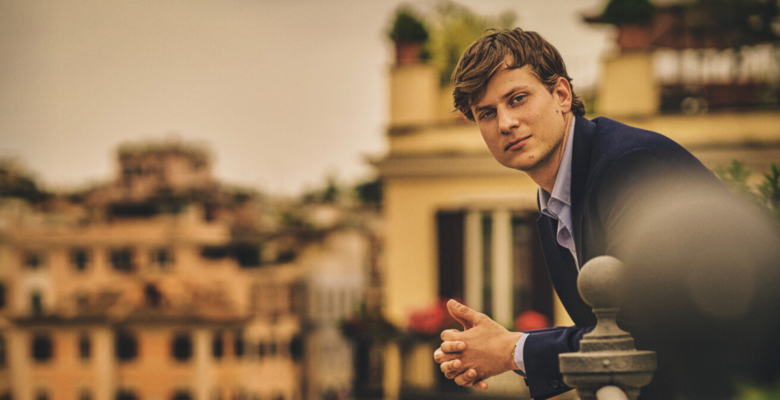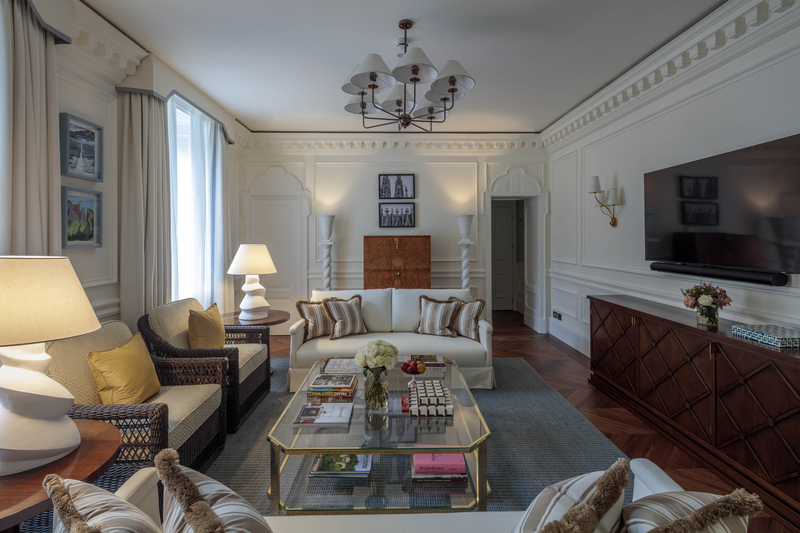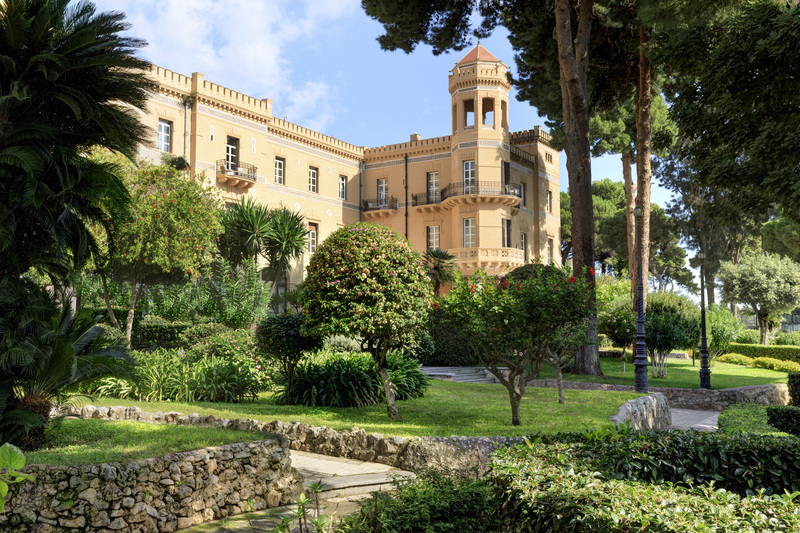
In an open conversation with Kommersant UK, Charles Forte, the mastermind behind business development at Rocco Forte Hotels, invites us into the heart of the luxury hotel industry. With warmth and insight, Charles talks about expanding his family’s iconic brand, balancing tradition with innovation, and creating memorable guest experiences. Join us as he shares stories from behind the scenes and his vision for Rocco Forte’s future.
Could you elaborate on your current role at Rocco Forte Hotels and the challenges you face working in a closely-knit family business?
I joined the team about seven years ago, primarily focusing on development, looking for new opportunities for the group. Every hotel we open has our family name on it, so it’s vital that everything is curated to the highest standard. Our business is truly family-run, with my two sisters, my aunt, my father and myself all heavily involved. We care deeply about every detail.
When I joined, the group was in the early stages of expansion again. I studied History at university, and after that, I briefly worked at CBRE in the Hotel Evaluations department. I also did short stints at other places, including Rothschilds, before joining the family business. At that time, we were gearing up for a growth phase. We had a Head of Development, who had previously worked for Four Seasons, and I learned a lot from him. Eventually, I took over the department a few years ago. Under my leadership, we've grown to 15 properties, and I’ve personally signed five additional deals since taking over.
Our expansion has gained great momentum and a new partner, PIF from Saudi Arabia, has invested in the business. This helped accelerate our growth, especially in Italy, where we’ve recently signed six properties. We also plan to expand into the Middle East, with a hotel in Dubai, and we’re looking at further opportunities in the U.S. and major European capitals. A lot of our guests come from the U.S., so establishing a presence there is a key part of our strategy.
Our focus remains on leisure-oriented, boutique properties with a homely, intimate feel—ranging from 16 to 100 rooms. We want to maintain that personal touch as a family-run business, avoiding the approach of some competitors who open hotels just for the sake of expanding. Many luxury brands have grown too quickly, and some are now struggling to manage all the new openings. We’re committed to steady, thoughtful growth, aiming to sign three hotels a year, ensuring each one reflects our values and high standards.
So, you just mentioned that there are now 15 Rocco Forte hotels across Europe. Is that correct? What’s your favourite one, and why?
I like them all for different reasons, so it’s hard to pick a singular favourite. Brown’s in London holds a special place for me because it feels like a second home. The office is just around the corner, so I’m there all the time and know the team really well.
Savoy in Florence is another favorite because it’s very intimate and gives off a great vibe. They have a fantastic housekeeping team, and it’s a very well-run, cohesive property.
Then there’s Villa Igiea — an iconic, special, and unique place. Of the new hotels we’re working on, the one I’m most excited about is Noto in Sicily, in the Baroque Valley. We’re converting a 18th-century palazzo into a 30-bedroom hotel called Palazzo Castelluccio. A rather eccentric Frenchman bought it about 10 years ago when it was in ruins. He slowly renovated it, and for various reasons, he decided to sell it. We were fortunate enough to buy it, and it’s truly stunning. The rooms are beautifully hand-painted, with original Sicilian tiles from different periods. It’s grand and will be incredibly unique—unlike anything else I’ve seen in Europe.
What is luxury to you?
There’s a baseline for luxury, right? The obvious things like attentive service, a team that anticipates your needs, functional and comfortable bedrooms, and luxurious design. But, for me, luxury is more about creating a sense of place—a sense of home. It’s not about cookie-cutter international luxury. Many ultra-luxury brands tend to use the same big-name interior designers while we prefer to work with residential interior designers who curate unique pieces. This helps create a home-like feeling. For me, luxury is about experiencing a place that feels unique and memorable, where the design connects with the overall concept. There needs to be a clear thread, or fil rouge, running through the hotel’s design. Luxury is more about the experience than having gold taps in the bathroom. It’s intangible in some ways, and definitely subjective.
When I stay at a hotel, I can overlook certain service mistakes, as long as there’s a warm atmosphere. You can immediately feel if the staff is happy, and that makes a massive difference to me. Positive energy, a sense of community, and staff who are proud to be there create a warmth that makes you feel like you’re at home. That is critical to the luxury experience.
Have you ever hosted royals or European aristocracy in your hotels? Did they have any particular demands?
Yes, we’ve had many over the years. Some of our hotels have a long history of hosting royals and celebrities. For example, at Brown’s, Rudyard Kipling lived here and wrote The Jungle Book, and Alexander Graham Bell made the first European phone call here. We’ve also hosted royal state visits—Queen Victoria stayed at Brown’s. Our hotel in Palermo has seen pretty much every head of state and monarch over the last 200 years and Hotel de la Ville in Rome is Hollywood star favourite.
Do you find the rich and famous easier clients, or are they more complicated than business people?
It depends. Some are more low-key, while others can be more difficult to please. We deal with tough clients all the time—it’s part of the luxury hotel business. There are so many things that can go wrong, and the experience is very subjective. That’s why there’s space for so many different brands, because people have specific preferences. But it’s a challenging business. You really have to enjoy it, because it’s relentless. One mistake, and you get a bad review that stays online forever.
What were the biggest challenges in hospitality post-COVID?
The biggest challenges were in business development. We own some of our hotels, but we also lease and manage others. When it comes to management opportunities, we compete with big players like Four Seasons, Mandarin Oriental, and Rosewood, which are purely operators. So, when an owner wants to develop a property, they often conduct a sort of "beauty contest" where brands submit proposals.
We focus on creating the best hotels in each market, but these larger brands can be aggressive, often making commercial deals that we aren’t always willing to match. Post-COVID, the challenges increased due to rising inflation. Rates have gone up significantly, construction costs have essentially doubled, and people's expectations of property values have increased as well. It’s become quite difficult to align all the pieces and find an investor. For new projects, we usually seek a capital partner to take on the development risk, but before COVID, with lower interest rates and cheaper financing, it was much easier to put together deals. Now, costs have soared, and the competition is tougher.
The competition is tougher...
Yes, it’s really tough, which is why we need to be careful about how we grow. If we start playing a numbers game—expanding into many destinations without focusing on the quality of the assets—we’d risk diluting our brand. What makes us special is that we’re small and curated. Growth only makes sense when the right opportunities come along.
And what about the UK market?
We’d love to do more in the UK. We were very close to signing a deal for a country house hotel in the Cotswolds. It would have been small, just 35 rooms in a beautiful manor house. But at the last minute, it was bought by someone else.
Gazumping isn’t just a problem for big companies—ordinary people buying houses face it all the time. It must be stressful.
It can be. The UK countryside is an interesting market, especially post-COVID. People couldn’t travel, so they rediscovered the English countryside, and now rates in top country hotels are comparable to boutique properties in cities.
We’re also looking for a second property in London—ideally in Mayfair, Chelsea, or Knightsbridge, but nothing too big. We’ve explored a few options.
We’re also developing Rocco Forte House, our serviced apartment concept. It’s an extension of our hotel infrastructure, catering to longer-stay guests. We have one in Rome, have just opened one in Milan, and another is planned for Dubai in 2028.
Did you come up with the Rocco Forte House concept?
Yes, I saw a gap in the market—there were lots of beautiful properties in prime locations that were too small to become traditional hotels. During COVID, there was increased demand for serviced apartments, so we started looking for suitable buildings to fill that niche.

In terms of development, how do you see the future of your chain?
We want to continue developing best-in-class hotels, but we don’t want to grow just for the sake of growth. We aim for thoughtful expansion that aligns with our brand values.
Are you planning to introduce any new technologies?
We’re somewhat anti-technology, at least when it comes to things that make the guest experience less personal. However, guest recognition technology is great—being able to know what our returning guests like, how they take their coffee, or what newspaper they prefer helps us provide a tailored experience. But I’m not a fan of rooms with 15 confusing buttons to operate everything. The goal should be simplicity.
In luxury, human connection remains the most important aspect. While technology like LEED certifications for energy efficiency is necessary, the heart of luxury is in the service and the atmosphere. We don’t believe in novelty for the sake of novelty; we focus on delivering new hotels with incredible attention to detail, investing in our people, their training, and the quality of the service.
You mentioned the importance of your staff. How do you find the right people, especially with the labour shortage in the UK post-Brexit?
It depends on the market. In some countries, it’s easier to find good people, but the UK can be challenging. However, if your workplace is seen as a nice place to work, and you offer good work-life balance, career progression, and training, it becomes easier.
The family aspect is key for us. We treat our staff like family and spend as much time in the hotels as possible to create meaningful relationships with them. We have strong staff retention, which is important for continuity, especially for returning guests who want to see familiar faces. We recently brought in a new HR director, and we’re doing a lot more in terms of learning and development to attract and retain great people. It’s definitely challenging, though, particularly in the luxury segment.
With the rise of AI, do you think it will affect your business?
AI can be useful for mundane tasks, like accounting or administrative work, but in terms of service, it doesn’t have much of a role. Luxury is about human connection, and that’s something AI can’t replicate. Some hotels have introduced things like in-room iPads for ordering room service, but we’ve always been against that. I’d much rather pick up the phone and speak to someone.
New generations seem to dislike phone calls.
Maybe I’m a bit old-fashioned. I think it’s important to have that personal touch, especially in hospitality. I started at the bottom—working during holidays, doing basic jobs—and it’s fundamental to running any business. It gives you perspective and respect for those roles.
What did you learn from those early experiences in hospitality?
It gave me a sense of perspective. The people in the least glamorous roles often have the most contact with guests and are crucial to the guest experience. It’s hard work, sometimes not well-paid, but people are passionate about hospitality. You work long hours, but you do it because there’s passion for the job. That’s what makes hospitality so different from other industries.
How do you stand for your views in such a closely-knit family business, especially as the youngest?
Family businesses can be tough, but we’re quite lucky—it works well for us. My father is great to work for, and he gives us plenty of space to make our own decisions and mistakes. We’ve each found our niche within the business. My aunt is Director of Design, my father is Chairman and oversees operations, my sister Lydia manages food and beverage, and my other sister Irene handles wellness and Spa projects. It’s a great team.
Do you have a family group chat?
Yes, but it’s mostly about the hotels! We spend a lot of time together on weekends, so we talk face-to-face too. Everything tends to revolve around the business.
Have you ever thought about doing something else?
Before I joined the family business, I wanted to make documentaries. But for various reasons, I decided to follow in my family’s footsteps. My grandfather left a big legacy in hospitality, and my father continued it. Seven years later, I’m happy with the path I chose.











